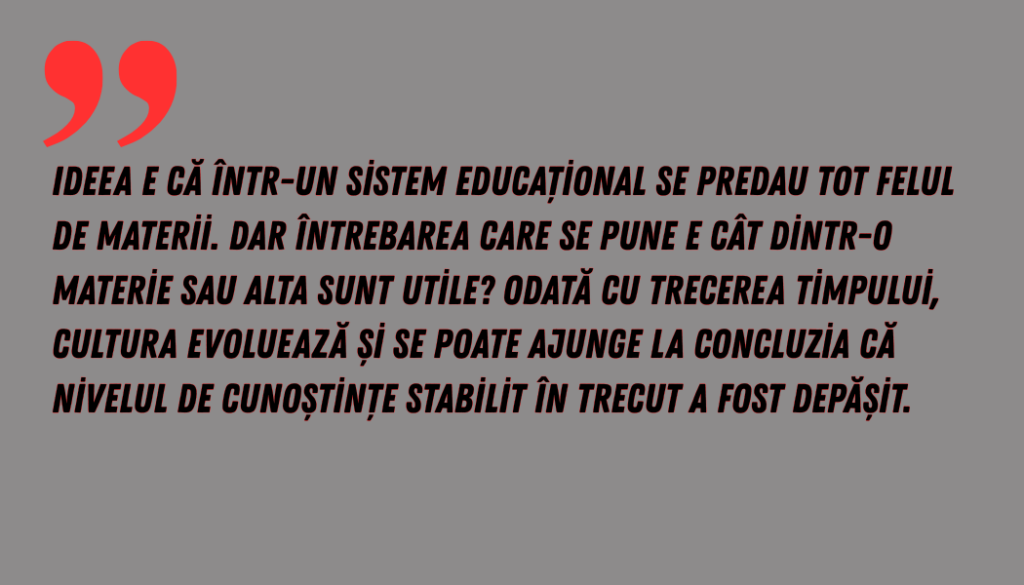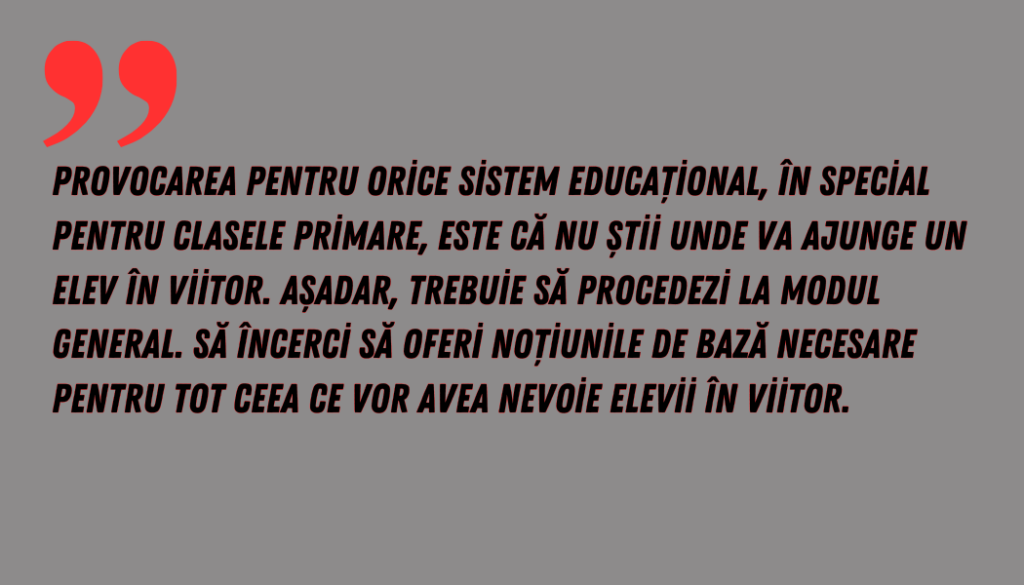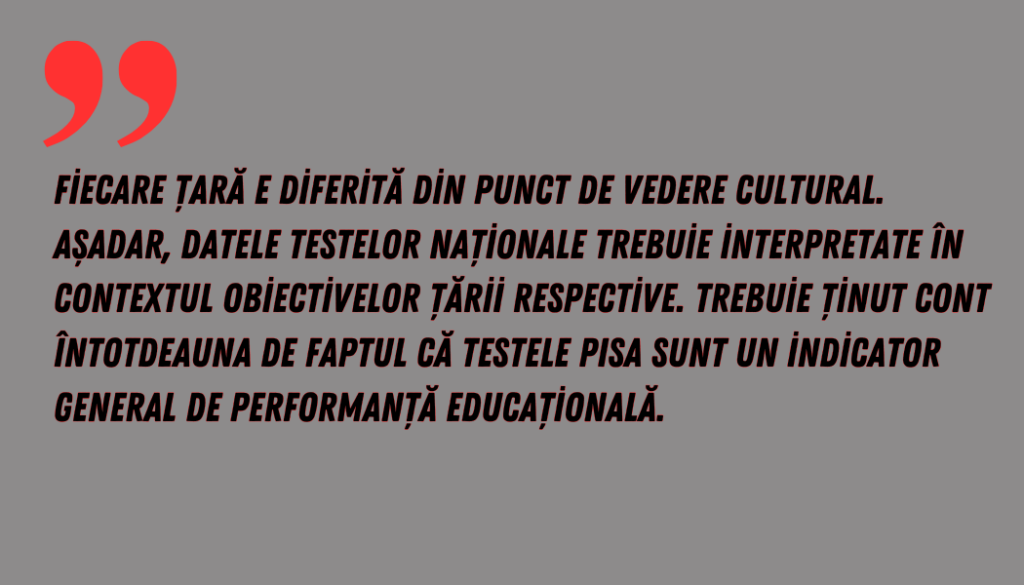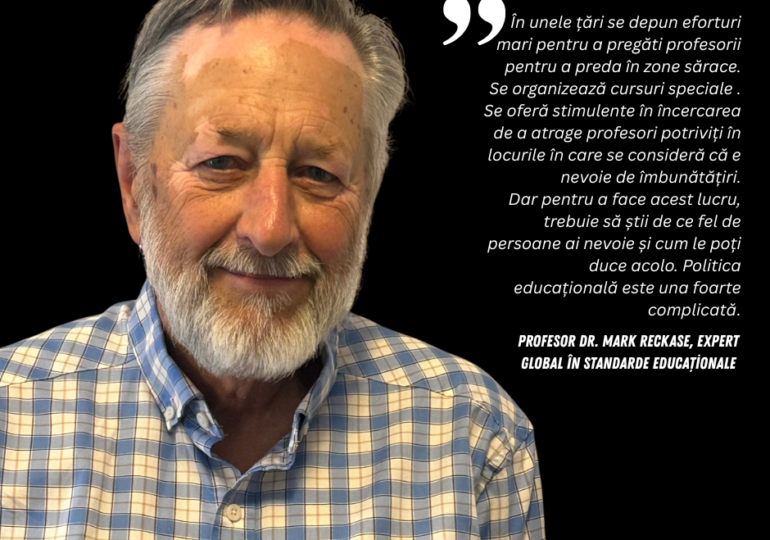In an attempt to solve the complicated issue of national testing, in other words, to bring some order to the chaos at the National Evaluation and BAC, two nationwide exams that provide contradictory information and cause a lot of discontent among the public opinion, the Ministry of Education has launched a program to train several dozens of experts from the country who are supposed to develop standards for national testing so that both the obtained grades and their evolution provide useful information about students, teachers, and the quality of educational activities.
To train the experts, Romania welcomed Professor Dr. Mark Reckase, one of the most important experts in the development of educational standards.
BRIO and Ascendia companies won the tender organized by the Ministry of Education and initiated the training program for the experts under the guidance of Mark Reckase.
He is an emeritus professor at Michigan State University and former president of the National Council on Measurement in Education (NCME) – one of the most important organizations in the world in the field of standardized testing. Reckase is considered one of the founders of computerized adaptive testing and multidimensional item response theory. Moreover, "Dr. Reckase has developed the conceptual framework for the psychometric theory of setting standards, highlighting the importance of aligning educational policies with test scores and has contributed for over four decades to the research and practice of educational testing. He has been involved in international projects of OECD and UNESCO regarding student performance measurement and defining common assessment frameworks and has provided expertise in implementing standardized testing in countries across Europe, Latin America, and Asia, supporting the development of fair, valid, and internationally comparable systems," the program presentation statement says.
In an interview with Spotmedia.ro, Professor Mark Reckase spoke about the main objective of education and why standards are needed in national testing.
Why are standards needed in the education system of a country?
The idea is that in an educational system, various subjects are taught. But the question is how much of one subject or another is useful? Over time, culture evolves and it can be concluded that the level of knowledge established in the past has been surpassed. You have to think about the fact that the world is changing, technology is changing, jobs are changing, all these things are changing. You have to think about how you can change and adapt the educational system to all these things people need to be happy and successful in life. And that's a big challenge.

How could educational standards help harmonize these issues?
Well, that's the goal, to ensure that students are prepared for all the opportunities they will have in the future.
The challenge for any educational system, especially for primary classes, is that you don't know where a student will end up in the future.
So, you have to proceed in a general way. Try to provide the basic notions needed for everything students will need in the future.
Then, as they progress and make decisions about what they want to do in life, there will be a sufficient educational foundation to achieve what they want next.
How long will the contract with the Ministry of Education last? And what does the training of Romanian experts involve?
I have a 9-month contract. Essentially, what I will do is talk about the methodologies used to train experts in education here in the country.
How to make decisions in the interest of students, what are the objectives of education, how much needs to be learned in a certain subject, related to the age of the students.
Do these experts work in the Ministry of Education or are they independent?
They are experts selected by the Ministry of Education. The course is a guide that shows them what they need to do and tells them what they need to follow, according to the educational direction to be followed in the future. So, it is a course oriented towards the future.
At the end of the program, what will the education system in Romania achieve?
There will be standards developed at multiple levels, namely basic, competent, and advanced, where competent means acceptable. The goal is for all students to reach the competent level through national tests.
How does the development of these standards relate to the PISA test?
They are not related to this test, but they are connected. PISA does the same thing, but based on international standards. However, each country must develop its own standards.
PISA is a general reference. However, because it is so general, it is only an approximate indicator of performance. Within a country, there are specific objectives that follow educational policies. Therefore, national standards can be much more precise.
When the PISA results are released, a national debate is triggered in which the results and evolution from one test to another are analyzed...
Each country is culturally different. Therefore, national test data must be interpreted in the context of the objectives of that particular country. It must be taken into account that PISA is a general indicator.
At the end of this program, will you write a kind of report, a document about this experience?
Well, there will be a document. What I'm trying to do is to train people in Romania on how to achieve these standards in education.
I am the person trying to develop the expertise of people in the country to do this. So, I will summarize how the training went.
Basically, there will be people in the country who will decide what it means to reach a level of competence in one subject or another. My job is to provide methodologies and ways to get to that answer.

In Romania, we have two major problems. We have a high dropout rate and a polarization in terms of academic results between the developed and less developed regions in Romania. Will the development of these standards and the creation of appropriate national tests help address these issues?
Yes. Because unifying standards and relevant national tests can provide precise information about educational issues, thus enabling a more efficient allocation of resources.
I have studied many countries. Romania is not among those I have studied. But in other countries I have seen, the above problem is related to how teachers are trained and then recruited and how they are distributed in different schools across the country.
Because in some places, of course, let's say you want to be in the center of events, in the center of Bucharest. It's an attractive place. I want to get a teaching position here. I want to teach at the best school in the city. I don't want to be in a small community, in the countryside. So the question is how can you recruit really good teachers to go and teach in schools in the provinces?
In some countries, great efforts are made to prepare teachers for different types of locations, to teach in poor areas. Special training courses are organized. Or special incentives are offered to teach in certain areas of the country, in an effort to attract better teachers to places where improvements are needed.
But to do this, you first need to know what kind of people you need and how you can get them there. So, educational policy is a very complex one. And thus, the process of teacher training, their allocation to schools, administration, and resources for schools, all go hand in hand with the major goal of achieving the desired educational outcomes.
Let me give you an example from the US. Iowa is an American federal state with a small and rural population, but it has one of the best educational systems in the country. Students in Iowa generally achieve very good results.
There are several excellent universities in Iowa that have educational programs for teacher training and for individuals involved in testing and all other aspects of the education system.
Throughout the state, due to the way the system operates, there are many teachers who want to go and teach in small communities in Iowa because they are pleasant places. They have the necessary resources to do a good job in terms of teaching standards.
Now, if you go to other states in the US, I could say that Louisiana has a very weak educational system because they do not invest in developing teaching standards and in getting people to move to rural communities to help improve the educational system there.
There are also international models that show how this can be done. Taiwan is a wonderful model. They have an excellent professional development program for teachers.
They are doing a great job and manage to convince teachers to move to rural areas, instead of just staying in Taipei.
I believe that, first, it is very important to find out where to invest, then you need to find out how to get the necessary incentives to go there and improve the educational system in the places where it is most needed. That is another big challenge.

How can university performance be improved through national testing standards?
It's a good question. What I have noticed working in many different universities and collaborating with people from many universities is that universities generally become specialized and attract people interested in a certain field.
For example, let's take Michigan State University, where I teach. It is a very good university in engineering. Currently, it is also very good in physics.
Physics, yes. Particle physics, because they have just built a huge accelerator, and now professors from all over the world are coming to work on this accelerator.
And I think that for a university to develop, it must have a magnetic program that attracts professors and students from everywhere. Now the question is: how do you develop such a program? First, like in the case of the accelerator at Michigan, you need to obtain funding from the government. You need to find people to work on this project for years, because it took years to build it. And you need to invest resources to bring it to completion.
This means that someone with the necessary vision must come to support such a project over a long period of time, to build this magnetic program. The University of Michigan happens to have one of the best education programs in the country and one of the best teacher training programs.
However, we have a similar problem to that in Romania, in the sense that many of those who are trained in Michigan do not stay in Michigan. They move to other states.
How can national tests and their results be linked to the transformation of the educational system? In Romania, we have another problem. We are quite good at general knowledge, but the education system is weak in terms of developing professional skills.
There are two aspects to this problem. First, the tests. Developing them is a very difficult and complicated task. Because, in reality, you need to make sure that the test truly corresponds to what you want to be learned.
So, a part of this project consists of analyzing and describing what should be learned. Thus, if students achieve good results on the test, you can deduce that they have learned what you proposed through the education policy. So this connection is very close. But the second aspect is the purpose of education.
And here, over time, we have received different responses. One of the purposes of education is to become a lifelong learner. To love learning.
Well, that's a poetic idea. But some people say, "Yes, that's what we want to do." Another purpose is to be able to get a good job. Well, that is related to work, it is related to money. Or another says that education helps you to be a good citizen. To be informed and know how to vote and participate in the social and political life of the country.
So one of the questions is, since we do not know what these students will do when they grow up, we need to figure out how to prepare them in a general way, so that they are prepared for all these things and as they progress in higher grades, they can follow their interests and become better in one field or another.
This is the challenge of education. My personal opinion is that the purpose of education is to have enough people with diverse knowledge who can function well and help develop society.
This should be the first important objective of any education system.

